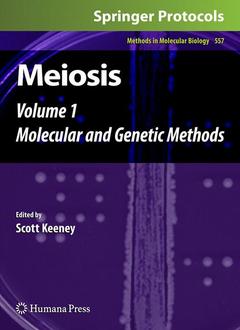Meiosis, Softcover reprint of the original 1st ed. 2009 Volume 1, Molecular and Genetic Methods Methods in Molecular Biology Series, Vol. 557
Langue : Anglais
Coordonnateur : Keeney Scott

Each generation in a sexually reproducing organism such as a fly or a mouse passes through the bottleneck of meiosis, which is the specialized cell division that gives rise to haploid reproductive cells (sperm, eggs, spores, etc. ). The principal function of meiosis is to reduce the genome complement by half, which is accomplished through sequential execution of one round of DNA replication followed by two rounds of chromosome segregation. Within the extended prophase between DNA replication and the first meiotic division in most organisms, homologous maternal and paternal chromosomes pair with one another and undergo homologous recombination, which establishes physical connections that link the homologous chromosomes until the time they are separated at anaphase I. Recombination also serves to increase genetic diversity from one generation to the next by breaking up linkage groups. The unique chromosome dynamics of meiosis have fascinated scientists for well over a century, but in recent years there has been an explosion of new information about how meiotic chromosomes pair, recombine, and are segregated. Progress has been driven by advances in three main areas: (1) genetic identification of meiosis-defective mutants and cloning of the genes involved; (2) development of direct physical assays for DNA intermediates and products of recombination; and (3) increasingly sophisticated cy- logical methods that describe chromosome behaviors and the spatial and temporal patterns by which specific proteins associate with meiotic chromosomes.
Genetic Methods for Studying Meiotic Recombination and Chromosome Dynamics.- Interaction of Genetic and Environmental Factors in Saccharomyces cerevisiae Meiosis: The Devil is in the Details.- Optimizing Sporulation Conditions for Different Saccharomyces cerevisiae Strain Backgrounds.- Modulating and Targeting Meiotic Double-Strand Breaks in Saccharomyces cerevisiae.- Methods for Analysis of Crossover Interference in Saccharomyces cerevisiae.- Measurement of Spatial Proximity and Accessibility of Chromosomal Loci in Saccharomyces cerevisiae Using Cre?/loxP Site-Specific Recombination.- Genetic Analysis of Meiotic Recombination in Schizosaccharomyces pombe.- Analysis of Meiotic Recombination in Caenorhabditis elegans.- Visual Markers for Detecting Gene Conversion Directly in the Gametes of Arabidopsis thaliana.- Molecular Analysis of Recombination and Protein-DNA Interactions During Meiosis.- Gel Electrophoresis Assays for Analyzing DNA Double-Strand Breaks in Saccharomyces cerevisiae at Various Spatial Resolutions.- Genome-Wide Mapping of Meiotic DNA Double-Strand Breaks in Saccharomyces cerevisiae.- Detection of Meiotic DNA Breaks in Mouse Testicular Germ Cells.- End-Labeling and Analysis of Spo11-Oligonucleotide Complexes in Saccharomyces cerevisiae.- Detection of SPO11-Oligonucleotide Complexes from Mouse Testes.- Stabilization and Electrophoretic Analysis of Meiotic Recombination Intermediates in Saccharomyces cerevisiae.- Using Schizosaccharomyces pombe Meiosis to Analyze DNA Recombination Intermediates.- Analysis of Chromatin Structure at Meiotic DSB Sites in Yeasts.- Analysis of Protein–DNA Interactions During Meiosis by Quantitative Chromatin Immunoprecipitation (qChIP).- Genome-Wide High-Resolution Chromatin Immunoprecipitation of Meiotic ChromosomalProteins in Saccharomyces cerevisiae.- Parallel Detection of Crossovers and Noncrossovers in Mouse Germ Cells.- Analysis of Meiotic Recombination Products from Human Sperm.
State-of-the-art techniques for analysis of meiotic recombination Comprehensive methods for studying meiosis in human and in many commonly used model organisms Chapters on background theory, methodology, and statistical considerations for classical genetic analysis of recombination and crossover interference Cutting-edge methods for the direct detection, quantification, and characterization of the DNA intermediates and products of the recombination pathway
Date de parution : 08-2016
Ouvrage de 365 p.
19.3x26 cm
Date de parution : 07-2009
Ouvrage de 365 p.
19.3x26 cm
Thèmes de Meiosis :
© 2024 LAVOISIER S.A.S.



